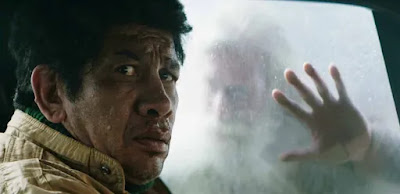Murder Me, Monster
Muere, monstruo, muere
Writer & Director ~ Alejandro Fadel
2018, Argentina-France-Chile
Stars ~ Víctor LópezEsteban BigliardiTania Casciani
A glorious oddity that is more
aligned with (so-called) slow arthouse cinema than the exploitation or the fun
monster movies promised by its title. It veers between awe-inspiring bright
vistas of the Andes Mountains* but becomes increasingly nocturnal – those
flares-in-the-night scenes are gorgeous. My initial impression was that this
was like the ‘Once Upon a Time in Antonia’ of monster films. It is
gruesome and ikky, but Fadel’s interest is in the machismo of such an isolated
location rather than monster shocks. The true assets are Víctor López’s craggy face
and quasi-elegant dancing, not to mention his troubling subservience to his
melancholy but surely unstable Capitán (Jorge Pado). The feel is dirty and sad, of people going through
the motions, a forgotten community. The sudden spate of
headless corpses that appears in this remote town seems only to generate more
melancholy, self-doubt and existential male confusion.The only considered suspect insists that a legendary monster is responsible.
The English title is one that
will automatically hook me, taken from the mantra in the narrative (is
telepathy involved?). The original Spanish is 'Muere, monstruo, muere' meaning "Die, Monster, Die".
(And if you are intrigued, read no further for best to be on tenterhooks about if the monster will appear or not. And don 't google.)
If the insistence on obliqueness may prove unsatisfying for some, for the mysteries will remain intact, the reveal of the outré, absurd and outrageous monster will be worth the patience for others. When it appears, all the moodiness and sexual disquiet and repression that has preceded is suddenly resolved with a WTF? This is revealed without breaking a sweat, with all the casualness and downbeat energy that has defined the film. Certainly, all its symbolism – and it’s a more overtly genital-based monster than Giger’s Alien but matches that of ‘The Strangeness’ – implies that some meaning has been achieved, but the monster’s mythological status and roots in the geometry of the landscape means its meaning is left vague. The film isn’t afraid to show this goofy-hideous monster in close-up, and it’s left as an Id of masculine depravity wandering the beautiful landscape unchallenged.
· * And if you want more of this, the accompanying short film (on Blu-ray) that exists within this world offers three helmeted figures arguing about “Freedom” amidst drone-electro and jaw-dropping landscapes.














